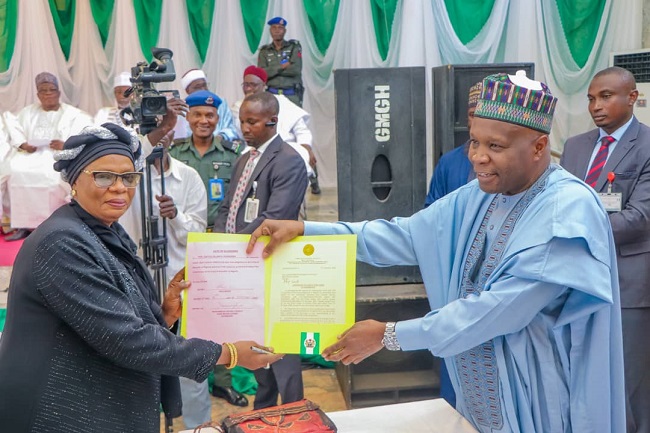FG to implement policies, programs to quell the trend of low productivity
THE federal government is committed to continuing to enforce the implementation of established institutional and legal frameworks to anchor policies and programs aimed at embedding productivity awareness in society.
According to a statement in Abuja from the Director of Press and Public Relations of the Federal Ministry of Labor and Employment, Olajide Oshundun, the Permanent Secretary of the Federal Ministry of Labor and Employment, Kachollom Daju, the said at the 2023 meeting of the National Productivity Council, held recently at the Radisson Hotel, Ikeja, Lagos.
Daju stressed that the federal government is giving priority to improving national productivity, as low productivity in most sectors of the country has become an obstacle to achieving the country's development goals and aspirations.
Similar Items
She added that the manufacturing sector had taken a hit, which was evident in foreign exchange earnings, the limited number of jobs created and an import bill that can hardly be supported by current incomes, the Nigeria's GDP growth has averaged 1.1% over the past seven years. years, according to the 2021 National Bureau of Statistics report, leading to rising unemployment and underemployment rates while pushing at least 133 million Nigerians into poverty.
“According to the National Bureau of Statistics, Nigeria’s GDP growth has averaged 1.1% over the past seven years, between 2015 and 2021, even as the country has experienced two recessions. This has driven unemployment and underemployment rates to a record high of 56.1% in 2020, pushing at least 133 million Nigerians into multidimensional poverty,” she said.
She said government efforts to address low productivity include putting in place a legal framework to drive relevant policies and programs.
Daju revealed that the ministry, through its Productivity Measurement and Labor Standards (PMLS) department, in conjunction with the National Productivity Center, was at the forefront of the response of the federal government, monitoring trends, conducting surveys and continuing the strategic implementation of initiatives aimed at improving Nigeria's global productivity rankings.
"The National Productivity Council is one of the structures provided for in the National Productivity Policy along with the State Productivity Council and local government committees to give full effect to the implementation of the politics.
"The inauguration of this council in January 2022 demonstrates the government's recognition of the role of productivity improvement and its unwavering commitment to mainstreaming productivity awareness into the national plan. ", she said.
The Permanent Secretary urged board members to come up with a strategic and analytical narrative that will chart the way forward to improve the productivity landscape in Nigeria, keeping in mind the challenges posed by insecurity, improvements in information technology, artificial intelligence, outsourcing of jobs, among others.
She also commended the council for having a full understanding of the issues involved in consolidating the achievements of the government's aspiration through the resolutions of its 2022 meeting.
She underscored the government's commitment to galvanizing human and financial resources to ensure that the country's productivity rankings and global competitiveness occupy an enviable position in the committee of nations.
Speaking also, the Director of PMLS, Ms. Juliana Adebambo reiterated the importance of productivity for any economy, saying that it plays a pivotal role in sustaining the global economy and that Nigeria is n was no exception as it is the foundation of the economy. growth and development.
According to her, the country's productivity depended on the ability of the economy to transform land, labor, capital and other inputs into goods and services.
Adebambo observed that the council's decision to meet was appropriate as a new government had recently taken over and hoped that the council's deliberations and recommendations would help the current administration pave the way for a society. more productive for the economic well-being of citizens and national development.
YOU SHOULD NOT MISS THESE HEADLINES FROM THE NIGERIAN TRIBUNE
The thought of not graduating first class gave me high blood pressure —Shukroh Adeyemi, ...

THE federal government is committed to continuing to enforce the implementation of established institutional and legal frameworks to anchor policies and programs aimed at embedding productivity awareness in society.
According to a statement in Abuja from the Director of Press and Public Relations of the Federal Ministry of Labor and Employment, Olajide Oshundun, the Permanent Secretary of the Federal Ministry of Labor and Employment, Kachollom Daju, the said at the 2023 meeting of the National Productivity Council, held recently at the Radisson Hotel, Ikeja, Lagos.
Daju stressed that the federal government is giving priority to improving national productivity, as low productivity in most sectors of the country has become an obstacle to achieving the country's development goals and aspirations.
Similar Items
She added that the manufacturing sector had taken a hit, which was evident in foreign exchange earnings, the limited number of jobs created and an import bill that can hardly be supported by current incomes, the Nigeria's GDP growth has averaged 1.1% over the past seven years. years, according to the 2021 National Bureau of Statistics report, leading to rising unemployment and underemployment rates while pushing at least 133 million Nigerians into poverty.
“According to the National Bureau of Statistics, Nigeria’s GDP growth has averaged 1.1% over the past seven years, between 2015 and 2021, even as the country has experienced two recessions. This has driven unemployment and underemployment rates to a record high of 56.1% in 2020, pushing at least 133 million Nigerians into multidimensional poverty,” she said.
She said government efforts to address low productivity include putting in place a legal framework to drive relevant policies and programs.
Daju revealed that the ministry, through its Productivity Measurement and Labor Standards (PMLS) department, in conjunction with the National Productivity Center, was at the forefront of the response of the federal government, monitoring trends, conducting surveys and continuing the strategic implementation of initiatives aimed at improving Nigeria's global productivity rankings.
"The National Productivity Council is one of the structures provided for in the National Productivity Policy along with the State Productivity Council and local government committees to give full effect to the implementation of the politics.
"The inauguration of this council in January 2022 demonstrates the government's recognition of the role of productivity improvement and its unwavering commitment to mainstreaming productivity awareness into the national plan. ", she said.
The Permanent Secretary urged board members to come up with a strategic and analytical narrative that will chart the way forward to improve the productivity landscape in Nigeria, keeping in mind the challenges posed by insecurity, improvements in information technology, artificial intelligence, outsourcing of jobs, among others.
She also commended the council for having a full understanding of the issues involved in consolidating the achievements of the government's aspiration through the resolutions of its 2022 meeting.
She underscored the government's commitment to galvanizing human and financial resources to ensure that the country's productivity rankings and global competitiveness occupy an enviable position in the committee of nations.
Speaking also, the Director of PMLS, Ms. Juliana Adebambo reiterated the importance of productivity for any economy, saying that it plays a pivotal role in sustaining the global economy and that Nigeria is n was no exception as it is the foundation of the economy. growth and development.
According to her, the country's productivity depended on the ability of the economy to transform land, labor, capital and other inputs into goods and services.
Adebambo observed that the council's decision to meet was appropriate as a new government had recently taken over and hoped that the council's deliberations and recommendations would help the current administration pave the way for a society. more productive for the economic well-being of citizens and national development.
YOU SHOULD NOT MISS THESE HEADLINES FROM THE NIGERIAN TRIBUNE
The thought of not graduating first class gave me high blood pressure —Shukroh Adeyemi, ...
What's Your Reaction?






















